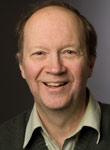Paul Sawyer lectures on writer John Ruskin
By Jacques Diec

Victorian writer John Ruskin played many roles throughout his life, but his vision remained constant.
"Whatever his subject, he tends to see the world in the same way: as an ecological system," professor of English Paul Sawyer observed Aug. 29 in Call Auditorium. Sawyer's discussion of Ruskin's life, career and philosophy, "The First Ecologist: John Ruskin and the Futures of Landscape," was the first event in Cornell Plantations' Fall Lecture Series.
"He imagined he would be a geologist, a poet, a painter, a bishop. He didn't become a great many of those things but in a way he becomes all of it through the meaning of prose," Sawyer said.
Born in 1819 in London, Ruskin's career as a critic of art and society was ultimately a search for human compassion and moral virtue, a duty he believed to be transcendent, Sawyer said. Disillusioned by the dehumanization of society through industrialization, he used the lessons of great art and architecture to imagine a new society that would be both healthy and humane.
As a young art critic, he was inspired by painter William Turner (1775-1851), who sought to create art through the direct observation of nature and by embellishing his works with emotion.
"Ruskin believed that human value comes from the ability to encounter nature spiritually," Sawyer said.
Many of Turner's works, such as "Falls of Schaffhausen" (1842) and "The Slave Ship" (1845), form a direct relationship with the viewer by creating a powerful emotion effect, Sawyer said: "His art allows you to feel, and suddenly you're feeling the painting and not observing it. Artists aren't supposed to be accurate. But for Ruskin, accuracy produces a sensation of energy."
2012 Fall Lecture Series
Talks in the 2012 Fall Lecture Series, all at 7:30 p.m. in Statler Auditorium:
Sept. 12: "Earth's Beautiful Ancient Forests: Can There Be a Happy Ending?" presented by Joan Maloof, ecologist and author;
Sept. 26: "Thomas Jefferson's Revolutionary Garden," by Peter J. Hatch, garden historian and Monticello's director of gardens and grounds emeritus;
Oct. 10: "Bringing Back the Pollinators: Protecting These Essential Creatures," by Scott Black, executive director, the Xerces Society for Invertebrate Conservation;
Oct. 24: "Whispering Willows and Lying Lilies: The Chemical Dialogues of Plant Behavior," by Robert Raguso, professor of neurobiology and behavior; and
Nov. 7: "The Garden of Six Friends: Designing a Contemporary East Asian Garden," by Marc Keane, landscape architect and writer.
He continued, "You're looking at Niagara Falls and you start to be viciously scared. You don't want to fall into it, but you're safe, so the feeling is tiny. Power kind of transfers into you as a result."
This was the effect Ruskin managed to convey in his prose as well, Sawyer said.
Turner depicted divine judgment in one of his works, which shows a slave ship throwing her slaves overboard during a violent storm.
The discoveries of geologists eventually led Ruskin to abandon his faith in the Bible, but his spirituality remained until his death at age 80 in 1900.
He would devote his later years to social critique and reform, continuing his fascination with society through his devotion to architecture.
Ruskin believed that while art expressed the spirit of its maker, "architecture expresses the spirit of the society that builds it."
His disdain toward mechanization and environmental pollution also continued to resurface, writing in 1860, "No amount of ingenuity will ever make iron digestible by the million, nor substitute hydrogen for wine" (from "Unto This Last").
"On a literal and a symbolic level, for him, the industrial labor system represented the corruption of an older organic society, because there are no longer connections between living things, just the pursuit of money," Sawyer explained. "Production should be for the sake of consumption. Production shouldn't be for the sake of accumulating gold or accumulating iron or building weapons. Production should be for the mouth."
From the art of language to the language of art, Ruskin envisioned a utopia of free minds and mutual relationships.
"Pleasure is essential," Sawyer said. "If we imagine a good society we have to imagine pleasure for everybody as well as material well-being." And art, for him, was always one of the great sources of pleasure.
Jacques Diec '15 is a writer intern for the Cornell Chronicle.
Media Contact
Get Cornell news delivered right to your inbox.
Subscribe